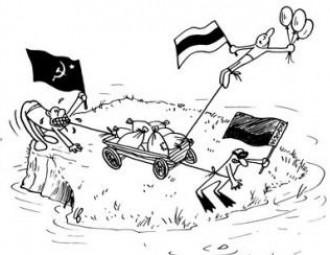Belarusans in search of ideology

From the necessity to form a special national path of Belarus to the acknowledgement of our country as an example in the postmodernist state capacity.
In such a wide range lie the opinions about the modern Belarusan ideology, views on which were shared among the political scientists, historians, philosophers, sociologists, culture experts and literary men. This exchange happened during the theoretical and practical conference “The problems of the modern Belarusan ideology” that took place in Minsk and whose organizers were the Institute of Belarusan history and culture and the analytical project Belarus Security Blog.
“We are not considering our conference to be an alternative event regarding the activity of the Official Structures of Belarus, who are occupied with the problems of ideology”, - announced the organizers of the conference at the very beginning, noting the burning necessity of ideology production, on the basis of which national state can be formed.

The range of opinions announced at the conference was very varied, the reporters held absolutely different concepts concerning the future of Belarus – from the creation of Baltic-Black Sea union, which will include our country as well as Ukraine and the Baltic States, to brave resistance to alien ideologies from all over the world.

Some openly phantasmagoric projects were heard as well. Thus, one of the speakers has suggested to all the present quite seriously getting involved into the search of a new name for Belarus. And he even supported his position with the words that “the people don’t care about anything, it makes no difference for them how will the country be named”, but “if we will explain everything on TV, they will understand”.

Some of the participants of the conference quite seriously suggested to look for the essence of the modern Belarusan ideology in the pre-Christian times. The philosopher Uladzimir Matskevich appealed to the enthusiastic historians to give up the antiquity: “The idea of indulging ourselves in the past gives comfort to the poetic souls, but does not correlate with activity and reality. If you want to build something, then build it with the modern means, but do not make heathen temples and rugged field stones”.

The sociologist Siarhei Nikaliuck in his statement noted the importance of the realization of the geopolitical choice by the Belarusan society and Belarusan élite: “This choice hasn’t been made up till now. Belarusans do not feel they belong neither to the West nor to the East. A great many assume that we are going our own special way. But the most vivid example of the special way is the example of Haiti. This country fell out of the civilized context. It is situated among catholic countries, but that place has voodoo as a religion and the French language, though everyone around speaks Spanish. The border between the Dominican Republic and Haiti can be seen from above: here is the burnt soil, and here is the blooming one. That’s the special way. And as I see it, the special way of Belarus is the way to nowhere”.

The statements of some of the participants of the conference made some of the organizers feel awkward. One of the inspirers of the conference, the historian Anatoly Taras, after the fiery speech on “mind is father to the beast” topic had to state: “Some emotional statements show that certain individuals don’t read books and with great aplomb tell about basic notions we are already all aware of. So I want to ask you to tell something with new features and not consider all the present to be half-educated morons”.
.jpg)
This was also noted by Uladzimir Matskevich in his statement: “The first thing to do is to stop fooling around. Ideology is the historical phenomenon, and historical period ideology belongs to is the age of modern. In this epoch there exist several phenomena, that haven’t existed before and would exist after in other forms. Besides ideology such notions as national state as such and nation belong to these phenomena. And in our times ideology is an anachronism, this is the past. Today modern countries are formed with the help of programs. The countries formed by the programs today are, for instance, several Far Eastern countries, which have the richest traditions, history, culture, which do not burrow into their past, but make programs which are developed quite different from how ideologies do”.
.jpg)
The organizers of the event noted that the value of this conference consists, first of all, in the fact that it is the first private view on the problem of the forming of the modern Belarusan ideology, and expressed hope that the discussion of the perspective of the common ideological basis of the Belarusan society will contribute to define the position ideology should take in the life of a young modern society.







-
03.01
-
07.10
-
22.09
-
17.08
-
12.08
-
30.09



























